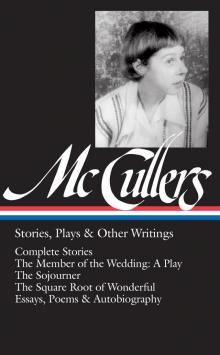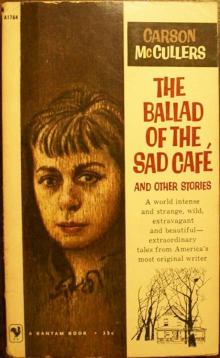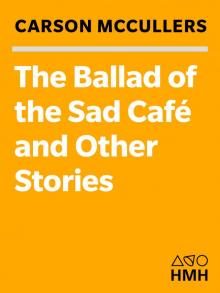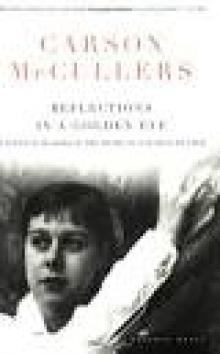- Home
- Carson McCullers
Clock Without Hands Page 3
Clock Without Hands Read online
Page 3
Tears of remembrance, pride and alcohol came to the Judge's weak eyes. "Soloed did you, darling? How did it feel?"
Jester considered a moment. "It didn't feel exactly like I had expected. I expected to feel lonely and somehow proud. But I guess I was just watching the instruments. I guess I just felt—responsible."
"Imagine, J.T.," the Judge said, "a few months ago this little rapscallion just announced to me that he was taking flying lessons at the airport. He'd saved his own money and already made the arrangements for the course. But with not so much as by-my-leave. Just announced, 'Grandfather, I am taking flying lessons.'" The Judge stroked Jester's thigh. "Didn't you, Lambones?"
The boy drew up one long leg against another. "It's nothing to it. Everybody ought to be able to fly."
"What authority prompts the young folks these days to act on such unheard of decisions? It was never so in my day or yours, J.T. Can't you see now why I am so afraid?"
The Judge's voice was grieving, and Jester deftly removed his drink and hid it on a corner shelf. Malone noticed this and was offended on the Judge's behalf.
"It's dinnertime, Grandfather. The car is just down the street."
The Judge rose ponderously with his cane and the dog started to the door. "Whenever you're ready, Lambones." At the door he turned to Malone. "Don't let the doctors intimidate you, J.T. Death is the great gamer with a sleeve of tricks. You and I will maybe die together while following the funeral of a twelve-year-old girl." He pressed his cheek to Malone and crossed the threshold to the street.
Malone went to the front of the place to lock the main door and there he overheard a conversation. "Grandfather, I hate to say this but I do wish you wouldn't call me Lambones or darling in front of strangers."
At that moment Malone hated Jester. He was hurt at the term "stranger," and the glow that had wanned his spirit in the presence of the Judge was darkened instantly. In the old days, hospitality had lain in the genius of making everyone, even the commonest constituents at a barbecue, feel that they belonged. But nowadays the genius of hospitality had disappeared and there was only isolation. It was Jester who was a "stranger"—he had never been like a Milan boy. He was arrogant and at the same time overpolite. There was something hidden about the boy and his softness, his brightness seemed somehow dangerous—it was as though he resembled a silk-sheathed knife.
The Judge did not seem to hear his words. "Poor J.T.," he said as the door of the car was opened, "it's such a shocking thing."
Malone quickly locked the front door and returned to the compounding room.
He was alone. He sat in the rocking chair with the compounding pestle in his hands. The pestle was gray and smooth with use. He had bought it with the other fixtures of the pharmacy when he had opened his business twenty years ago. It had belonged to Mr. Greenlove—when had he last remembered him?—and at his death the estate sold the property. How long had Mr. Greenlove worked with this pestle? And who had used it before him?... The pestle was old, old and indestructible. Malone wondered if it wasn't a relic from Indian times. Ancient as it was, how long would it still last? The stone mocked Malone.
He shivered. It was as though a draft had chilled him, although he noticed that the cigar smoke was undisturbed. As he thought of the old Judge a mood of elegy softened his fear. He remembered Johnny Clane and the old days at Sereno. He was no stranger—many a time he had been a guest at Sereno during the hunting season—and once he had even spent the night there. He had slept in a big four-poster bed with Johnny and at five in the morning they had gone down to the kitchen, and he still remembered the smell of fish roe and hot biscuits and the wet-dog smell as they breakfasted before the hunt. Yes, many a time he had hunted with Johnny Clane and had been invited to Sereno, and he was there the Sunday before the Christmas Johnny died. And Miss Missy would sometimes go there, although it was mainly a hunting place for boys and men. And the Judge, when he shot badly, which was nearly all the time, would complain that there was so much sky and so few birds. Always there was a mystery about Sereno even in those days—but was it the mystery of luxury that a boy born poor will always feel? As Malone remembered the old days and thought of the Judge now—in his wisdom and fame and inconsolable grief—his heart sang with love as grave and somber as the organ music in the church.
As he stared at the pestle his eyes were brilliant with fever and fear and, transfixed, he did not notice that from the basement underneath the store there was a knocking sound. Before this spring he had always held to a basic rhythm about life and death—the Bible rhythm of the three-score years and ten. But now he dwelt on the inexplicable deaths. He thought of children, exact and delicate as jewels in their white satin coffins. And that pretty singing teacher who swallowed a bone at a fish fry and died within the hour. And Johnny Clane, and the Milan boys who died during the first war and the last. And how many others? How? Why? He was aware of the knocking sound in the basement. It was a rat—last week a rat had overturned a bottle of asafetida and for days the stench was so terrible that his porter refused to work in the basement. There was no rhythm in death—only the rhythm of the rat, and the stench of corruption. And the pretty singing teacher, the blond young flesh of Johnny Clane—the jewel-like children—all ended in the liquefying corpse and coffin stench. He looked at the pestle with a sick surprise for only the stone remained.
There was a footstep on the threshold and Malone was so suddenly unnerved that he dropped the pestle. The blue-eyed nigger stood before him, holding in his hand something that glinted in the sun. Again he stared into those blazing eyes and again he felt that look of eerie understanding and sensed that those eyes knew that he was soon to die.
"I found this just outside the door," the nigger said.
Malone's vision was dimmed by shock and for a moment he thought it was the paper knife of Dr. Hayden—then he saw it was a bunch of keys on a silver ring.
"They're not mine," Malone said.
"I noticed Judge Clane and his boy was here. Maybe they're theirs." The nigger dropped the keys on the table. Then he picked up the pestle and handed it to Malone.
"Much obliged," he said. "I'll inquire about the keys."
The boy went away and Malone watched him jay-walk across the street. He was cold with loathing and hatred.
As he sat holding the pestle there was in him enough composure to wonder at those alien emotions that had veered so violently in his once mild heart. He was split between love and hatred—but what he loved and what he hated was unclear. For the first time he knew that death was near him. But the terror that choked him was not caused by the knowledge of his own death. The terror concerned some mysterious drama that was going on—although what the drama was about Malone did not know. The terror questioned what would happen in those months—how long?—that glared upon his numbered days. He was a man watching a clock without hands.
There was the rhythm of the rat. "Father, Father, help me," Malone said aloud. But his father had been dead for these long years. When the telephone rang Malone told his wife for the first time that he was sick and asked her to drive to the pharmacy and take him home. Then he sat stroking the stone pestle as a sort of comfort as he waited.
2
THE JUDGE kept the old-fashioned dinner hours and dinner on Sundays was at two o'clock. Shortly before the time to ring the dinner chimes, Verily, the cook, opened the shutters of the dining room which had been closed all morning against the glare. The midsummer heat and light beat at the windows and beyond there was the burnt lawn and the fever-bright border of flowers. Some elm trees at the end of the lawn were dark and breezeless in the lacquered brightness of the afternoon. Jester's dog responded first to the dinner summons—he walked slowly under the table, letting the long damask cloth linger against his spine. Then Jester appeared and stood waiting behind his grandfather's chair. When the old Judge entered, he seated him carefully and then took his own place at the table. The dinner began according to custom and as usual vegetable soup was the fi
rst course. With the soup two breads were served—beaten biscuits and cornsticks. The old Judge ate greedily, sipping buttermilk between swallows of bread. Jester could manage only a few spoonfuls of the hot soup and he drank iced tea and held the cold glass to his cheek and forehead from time to time. According to the habits of the house, there was no conversation during the soup course except for the Judge's customary Sunday remark: "Verily, Verily, I say unto you: you shall dwell in the house of the Lord forever." He added his little Sunday joke: "If you cook this well."
Verily said nothing—only pursed her purplish wrinkled lips.
"Malone has always been one of my most loyal constituents and best supporters," the Judge said when the chicken was brought and Jester had stood up to carve. "You keep the liver, Son, you ought to have liver at least once a week."
"Yes, Grandfather."
So far the meal was consonant with habits and the customs of the house. But later a strange dissonance appeared, a jolt in the usual harmony, a sense of cross purposes and communication deflected and estranged. Neither the old Judge nor his grandson realized what happened at the time, but at the end of the long, hot, customary meal they both felt that something had altered so that their relationship could never again be the same.
"The Atlanta Constitution today referred to me as a reactionary," the Judge said.
Jester said softly: "I'm sorry."
"Sorry," said the old Judge. "It's nothing to be sorry about. I'm glad!"
Jester's brown eyes exchanged a long, asking stare.
"You must take the word 'reactionary' literally these days. A reactionary is a citizen who reacts when the age-long standards of the South are threatened. When States' rights are trampled on by the Federal Government, then the Southern patriot is duty-bound to react. Otherwise the noble standards of the South will be betrayed."
"What noble standards?" Jester asked.
"Why, boy, use your head. The noble standards of our way of life, the traditional institutions of the South."
Jester did not say anything but his eyes were skeptical and the old Judge, sensitive to all his grandson's reactions, noticed this.
"The Federal Government is trying to question the legality of the Democratic Primary so that the whole balance of Southern civilization will be jeopardized."
Jester asked, "How?"
"Why, boy, I'm referring to segregation itself."
"Why are you always harping on segregation?"
"Why, Jester, you're joking."
Jester was suddenly serious. "No, I'm not."
The Judge was baffled. "The time may come in your generation—I hope I won't be here—when the educational system itself is mixed—with no color line. How would you like that?"
Jester did not answer.
"How would you like to see a hulking Nigra boy sharing a desk with a delicate little white girl?"
The Judge could not believe in the possibility of this; he wanted to shock Jester to the gravity of the situation. His eyes challenged his grandson to react in the spirit of Southern gentlemen.
"How about a hulking white girl sharing a desk with a delicate little Negro boy?"
"What?"
Jester did not repeat his words, nor did the old Judge want to hear again the words that so alarmed him. It was as though his grandson had committed some act of incipient lunacy, and it is fearful to acknowledge the approach of madness in a beloved. It is so fearful that the old Judge preferred to distrust his own hearing, although the sound of Jester's voice still throbbed against his eardrums. He tried to twist the words to his own reason.
"You're right, Lambones, whenever I read such communist ideas I realize how unthinkable the notions are. Certain things are just too preposterous to consider."
Jester said slowly: "That's not what I meant." From habit Jester glanced to see if Verily was out of the room. "I can't see why colored people and white people shouldn't mix as citizens."
"Oh, Son!" It was a cry of pity, helplessness, and horror. Years ago when Jester was a child he had been occasionally subject to sudden vomiting fits at the table. Then, tenderness had overcome disgust, and afterward the Judge had felt himself sickish in sympathy. Now the old Judge responded to this sudden situation in the same way. He held his good hand to his ear as if he had an earache and he stopped eating.
Jester noticed the old Judge's distress and he felt a tremor of sympathy. "Grandfather, we all have our own convictions."
"Some convictions are not tenable convictions. After all, what are convictions? They're just what you think. And you are too young, Son, to have learned the pattern of thought. You are just deviling your grandfather with foolish words."
Jester's emotion of sympathy withered. He was staring at a picture over the mantelpiece. The picture was a Southern scene of a peach orchard and a Negro shack and a cloudy sky.
"Grandfather, what do you see in that picture?"
The Judge was so relieved that the tension had snapped that he chuckled a little. "The Lord knows it ought to remind me of my folly. I lost a small fortune with those pretty peach trees. Your Great-aunt Sara painted it the year she died. And then right along afterward the bottom dropped out of the peach market."
"I mean, what do you actually see in the picture?"
"Why, there's an orchard and clouds and a Nigra shack."
"Do you see there between the shack and the trees a pink mule?"
"A pink mule?" The Judge's blue eyes popped in alarm. "Why naturally not."
"It's a cloud," Jester said. "And it looks to me exactly like a pink mule with a gray bridle. Now that I see it that way, I can't see the picture any other way any more."
"I don't see it."
"Why you can't miss it, galloping upward—a whole sky of pink mules."
Verily came in with the dish of corn pudding: "Why, mercy, what's the matter with you all. You ain't scarcely touch your dinner."
"All my life I had seen the picture like Aunt Sara had intended it. And now this summer I can't see what I'm supposed to see in it. I try to look back as I used to see it—but it's no good. I still see the pink mule."
"Do you feel dizzy, Lambones?"
"Why no. I'm just trying to explain to you that this picture is a sort of—symbol—I guess you might say. All my life I've seen things like you and the family wanted me to see them. And now this summer I don't see things as I used to—and I have different feelings, different thoughts."
"That's only natural, Son." The Judge's voice was reassuring, but his eyes were still anxious.
"A symbol," Jester said. He repeated the word because it was the first time he had spoken it in conversation, although it was one of his favorite words in school compositions. "A symbol of this summertime. I used to have ideas exactly like everybody else. And now I have my own ideas."
"Such as?"
Jester did not answer for a moment. And when he spoke his voice broke with tension and adolescence. "For one thing, I question the justice of white supremacy."
The challenge was plain as a loaded pistol flung across the table. But the Judge could not accept it; his throat was dry and aching and he swallowed feebly.
"I know it's a shock to you, Grandfather. But I had to tell you, otherwise you would have taken it for granite I was like I used to be."
"Take it for granted," the Judge corrected. "Not granite. What kind of wild-eyed radicals have you been consorting with?"
"Nobody. This summer I've been very—" Jester was going to say I've been very lonely, but he could not bring himself to admit this truth aloud.
"Well, all I say is, this talk about mixed races and pink mules in the picture are certainly—abnormal."
The word struck Jester like a blow in the groin and he flushed violently. The pain made him strike back: "All my life I have loved you—I even worshiped you, Grandfather. I thought you were the wisest, kindest man on earth. I listened to everything you said like gospel truth. I saved everything in print about you. My scrapbook on you was started as soon as I
began to read. I always thought you ought to be—President."
The Judge ignored the past tense and there was the warmth of self-pride in his veins. A mirrorlike projection reflected his own feelings for his grandson—the fair, unfolding child of his fair doomed son. Love and memory left his heart open and unaware.
"That time I heard about when that Negro from Cuba was making a talk in the House I was so proud of you. When the other congressmen stood up you sat back farther in your chair, propped your feet up and lighted a cigar. I thought it was wonderful. I was so proud of you. But now I see it differently. It was rude and bad manners. I am ashamed for you when I remember it. When I think back how I used to worship you—"
Jester could not finish, for the distress of the old Judge was obvious. His crippled arm tightened and his hand curled hard and spastic while the elbow joint crooked uncontrollably. The shock of Jester's words interacted with his disorder so that tears of emotional and physical hurt started. He blew his nose and said after some moments of silence: "Far sharper than a serpent's tooth it is to have a thankless child."
But Jester resented the fact that his grandfather was so vulnerable. "But Grandfather, you've talked all you want to always. And I have listened and believed. But now that I have a few opinions of my own, you won't stand for it and start quoting the Bible. That isn't fair because it automatically puts a person in the wrong."
"It's not the Bible—Shakespeare."
"Anyway I'm not your child. I'm your grandson and my father's child."
The fan turned in the breathless afternoon and the sun shone on the dining table with the platter of carved chicken and the butter melted in the butter dish. Jester held the cool tea glass to his cheek and fondled it before he spoke.
"Sometimes I wonder if I'm not beginning to suspect why my father—did what he did."
The dead still lived in the ornate, Victorian house with the cumbersome furniture. The dressing room of the Judge's wife was still kept as it was in her lifetime with her silver appointments on the bureau and the closet with her clothes untouched except for occasional dusting. And Jester grew up with his father's photographs, and in the library there was the framed certificate of admittance to the bar. But though all through the house there were reminders of the lives of the dead, the actual circumstance of death was never mentioned, even by inference.

 Carson McCullers
Carson McCullers Clock Without Hands
Clock Without Hands The Ballad of the Sad Cafe: And Other Stories
The Ballad of the Sad Cafe: And Other Stories The Member of the Wedding
The Member of the Wedding Collected Stories
Collected Stories The Ballad of the Sad Cafe
The Ballad of the Sad Cafe Reflections in a Golden Eye
Reflections in a Golden Eye The Heart Is a Lonely Hunter
The Heart Is a Lonely Hunter Carson McCullers - Reflections In A Golden Eye
Carson McCullers - Reflections In A Golden Eye Collected Stories of Carson McCullers
Collected Stories of Carson McCullers